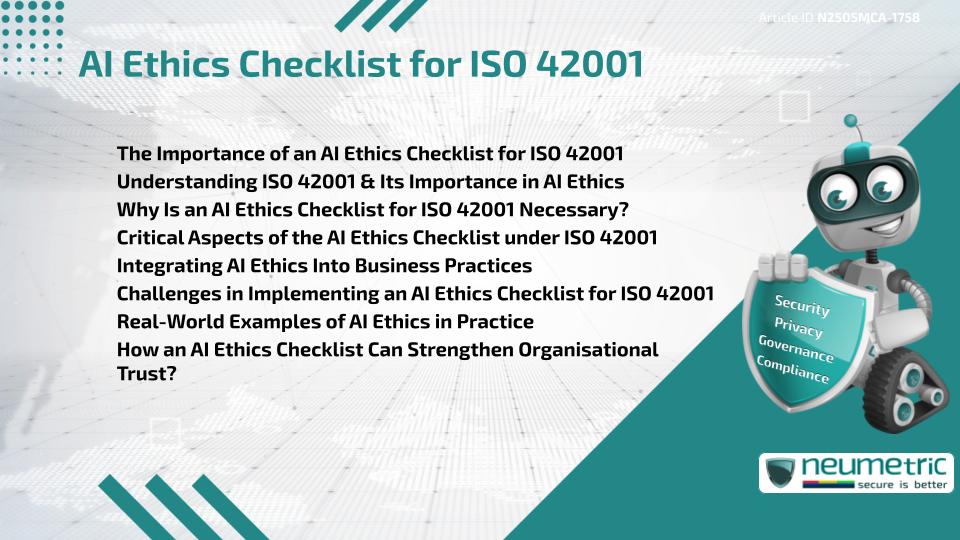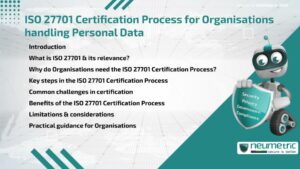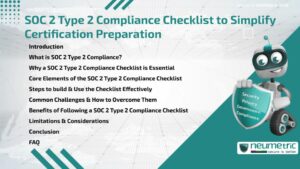Table of Contents
ToggleThe Importance of an AI Ethics Checklist for ISO 42001
AI is becoming an integral part of numerous industries, providing innovative solutions across sectors. However, as AI technologies evolve, so does the need for Ethical Standards to govern their development & implementation. One critical Standard gaining traction is ISO 42001, which outlines ethical guidelines for AI Systems. An AI ethics checklist for ISO 42001 helps Organisations adhere to these standards, promoting transparency, accountability & fairness in their AI initiatives.
Understanding ISO 42001 & Its Importance in AI Ethics
ISO 42001 is a globally recognised Framework designed to guide the responsible development & use of AI Systems. Its goal is to ensure that AI is utilised in ways that are ethical, transparent, & advantageous to society. By establishing clear ethical guidelines, ISO 42001 provides a structured approach to managing the Risks & impacts of AI technology. Implementing an AI ethics checklist for ISO 42001 is one way organisations can make sure they adhere to these standards.
ISO 42001 is important because it addresses core areas of AI ethics, such as:
- Accountability: Holding organisations responsible for their AI Systems.
- Transparency: Ensuring AI Systems are explainable & understandable.
- Fairness: Preventing biases in AI algorithms & decision-making processes.
By incorporating these principles into AI Practices, ISO 42001 promotes the development of trustworthy AI Systems.
Why Is an AI Ethics Checklist for ISO 42001 Necessary?
An AI ethics checklist for ISO 42001 is crucial for organisations aiming to create a transparent & ethical AI strategy. Without a structured checklist, companies may overlook key ethical considerations, potentially leading to issues such as:
- Unfair decision-making by AI Systems.
- Lack of accountability for AI actions.
- Inability to explain AI System decisions to Stakeholders.
This checklist ensures that AI Systems meet the necessary Ethical Standards & can be audited for Compliance, helping organisations mitigate these Risks & build public trust.
Critical Aspects of the AI Ethics Checklist under ISO 42001
An AI ethics checklist for ISO 42001 contains several essential elements that steer the ethical development of AI Systems. These elements address various concerns regarding AI transparency, accountability, & fairness. Key items typically include:
- Bias & Fairness Assessment: Ensuring that AI Models do not perpetuate or introduce biases that can negatively affect decision-making.
- Transparency & Explainability:AI systems should be clear & explainable to non-expert users, helping to build trust in the system’s decisions.
- Data Privacy & Protection: Ensuring AI Systems handle Personal Data responsibly & in Compliance with Data Protection regulations.
- Accountability Mechanisms: Defining clear accountability for the outputs of AI Systems, particularly in decision-making situations.
- Impact Assessment: Analysing the potential societal & ethical impacts of AI Systems, particularly in sensitive areas such as Healthcare or criminal justice.
By following this checklist, organisations can ensure they are not only compliant with ISO 42001 but also contributing positively to the ethical landscape of AI.
Integrating AI Ethics Into Business Practices
Incorporating Ethical AI Practices into an organisation’s daily operations is critical for long-term success. An AI ethics checklist for ISO 42001 helps businesses:
- Create AI Policies that comply with ISO 42001 standards.
- Implement robust Governance frameworks for ethical oversight.
- Cultivate a culture of responsibility, ensuring AI is leveraged for the greater good of society.
AI ethics must not be treated as an afterthought but as a core component of Business Operations.By integrating Ethical AI Practices into organisational processes, companies can not only comply with regulations but also establish a reputation for responsible AI usage.
Challenges in Implementing an AI Ethics Checklist for ISO 42001
Implementing an AI ethics checklist for ISO 42001 is not without its challenges. Some common barriers include:
- Lack of expertise: Many organisations lack the in-house expertise needed to properly assess AI ethics & implement ISO 42001 Guidelines.
- Cost of Compliance: Adhering to ISO 42001 standards may require significant investments in AI Governance & auditing systems.
- Complexity of AI Systems: As AI technologies become more complex, ensuring they meet ethical guidelines becomes more difficult.
Despite these challenges, the benefits of implementing an AI ethics checklist for ISO 42001 far outweigh the difficulties, as it strengthens organisational reputation & mitigates the Risk of ethical breaches.
Real-World Examples of AI Ethics in Practice
Various industries are increasingly adopting ethical AI Frameworks to address the Risks associated with AI. For example, companies like Google & Microsoft have developed AI ethics Policies to ensure their technologies align with ethical principles like fairness & transparency. These efforts showcase how implementing an AI ethics checklist for ISO 42001 can lead to responsible AI deployment that benefits society.
How an AI Ethics Checklist Can Strengthen Organisational Trust?
Building & maintaining trust is crucial for organisations, especially when dealing with emerging technologies like AI. An AI ethics checklist for ISO 42001 not only helps ensure Compliance with Ethical Standards but also demonstrates a commitment to ethical practices, increasing Stakeholder confidence. Organisations that prioritise AI ethics foster a positive reputation, which can lead to greater Customer loyalty & attract new business opportunities.
Takeaways
- An AI ethics checklist for ISO 42001 ensures organisations adhere to ethical guidelines for AI Systems, promoting transparency, fairness, & accountability.
- Implementing ISO 42001 standards helps mitigate AI Risks & enhances trust with Stakeholders.
- An AI ethics checklist is essential for addressing challenges like bias, data privacy, & transparency in AI decision-making.
- While challenges exist, the benefits of Ethical AI Practices make Compliance with ISO 42001 valuable for long-term success.
FAQ
What is ISO 42001, & why does it matter for AI ethics?
ISO 42001 is a global Standard for Ethical AI Practices, focusing on transparency, fairness, & accountability in AI Systems. It ensures organisations meet ethical & regulatory expectations.
How can an AI ethics checklist help organisations?
An AI ethics checklist helps organisations ensure their AI Systems are developed & implemented responsibly, tackling concerns such as bias, fairness, & transparency.
What are the key elements of an AI ethics checklist for ISO 42001?
Key elements include bias & fairness assessment, transparency, Data Privacy, accountability, & impact assessments.
Why should businesses care about implementing AI ethics in their practices?
Businesses that integrate AI ethics can build trust, mitigate Risks, & Ensure Compliance with Global Standards like ISO 42001, enhancing their reputation & long-term success.
Need help?
Neumetric provides organisations the necessary help to achieve their Cybersecurity, Compliance, Governance, Privacy, Certifications & Pentesting goals.
Organisations & Businesses, specifically those which provide SaaS & AI Solutions, usually need a Cybersecurity Partner for meeting & maintaining the ongoing Security & Privacy needs & requirements of their Clients & Customers.
SOC 2, ISO 27001, ISO 42001, NIST, HIPAA, HECVAT, EU GDPR are some of the Frameworks that are served by Fusion – a centralised, automated, AI-enabled SaaS Solution created & managed by Neumetric.
Reach out to us!





